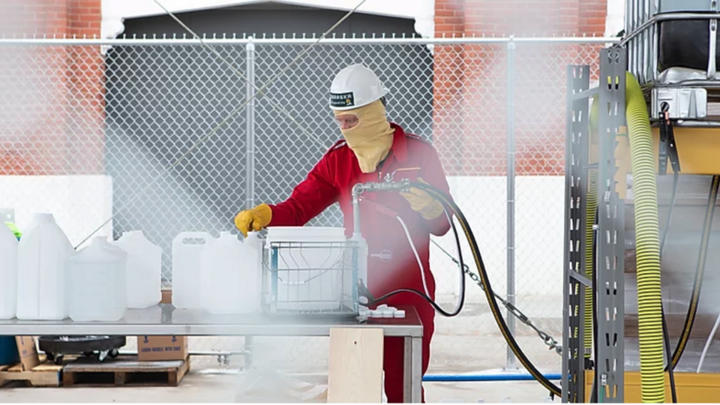Hand sanitizer production pauses after 200K gallons

After manufacturing and donating more than 200,000 gallons of hand sanitizer at Nebraska Innovation Campus, production and distribution will cease on July 31.
This will be the final date for external entities to place or pick up any orders at NIC. All college or department orders will remain available through UNL Marketplace, as there is inventory reserved for use at Nebraska.
The university set up the temporary production just over four months ago to assist the state’s medical, educational and business communities during the COVID-19 pandemic.
The project was first conceived by Hunter Flodman, associate professor of practice of chemical and biomolecular engineering, and Jan tenBensel of the Nebraska Ethanol Board. The Food Processing Center was chosen as the production site, which required registration with the FDA as an over-the-counter drug production facility. Flodman went to work around the clock to get the temporary plant set up.
“Beginning in mid-March, we knew there was a large demand for hand sanitizer (due to the pandemic) that the supply chain couldn’t fulfill,” Flodman said. “We also knew the State of Nebraska had the resources to produce large quantities of hand sanitizer because of our large ethanol industry. We wanted to help and so we brought those private and state agencies together with the university to accomplish the task.”
“At the time, I thought if we produced 10,000 gallons, that would be significant,” Terry Howell, executive director of the Food Processing Center, said. “Our production staff has been extremely dedicated to the project. And one of the great things that happened throughout all of this, has been engaging and building relationships with groups that we normally wouldn’t have interacted with and discovering their many talents. That’s a win in of itself.”
To date, the plant has distributed over 1,100 individual web orders for hand sanitizer, impacting nearly every county in Nebraska. Recipients include K-12 school districts, hospitals, medical providers, community organizations, essential businesses and the University of Nebraska campuses.
More details available via this link.
